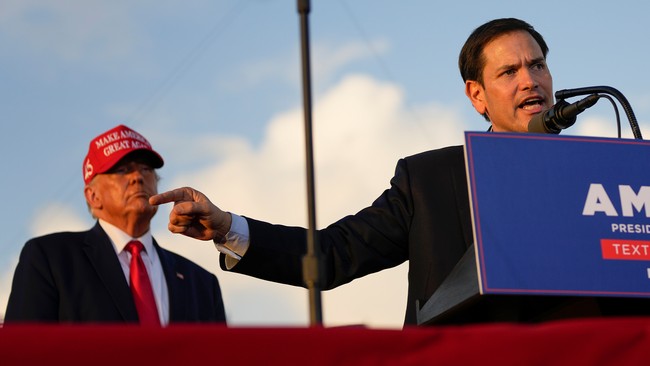Marco Rubio: Trump's Potential Secretary of State Choice
Donald Trump is reportedly poised to nominate Senator Marco Rubio as Secretary of State, drawing attention due to Rubio's foreign policy stances and Latino heritage.
Published November 13, 2024 - 00:11am

Image recovered from redstate.com
In a significant move that is stirring debate across political spectrums, President-elect Donald Trump is reported to be considering Marco Rubio for the role of Secretary of State. Various sources, including major US news outlets and political analysts, are speculating on the implications of such an appointment. The appointment would mark a pivotal moment in American politics, as it not only exemplifies Trump's strategy of selecting key figures known for their loyalty and alignment with his MAGA agenda but also highlights Rubio's evolution in foreign policy matters.
Rubio, a prominent figure in American politics with Cuban roots, would become the first Hispanic Secretary of State if the appointment comes to fruition. This move has the potential to impact the Latino voter base that has increasingly shown support for the Republican party in recent years. The Florida Senator was previously a contender for Vice President, showcasing his sustained prominence within the political landscape. His potential appointment raises questions about the future direction of US foreign policy, especially with his history of advocating for a robust approach towards America's geopolitical adversaries like China, Iran, and Cuba.
Rubio's stance on the conflict in Ukraine has gained attention, as he recently suggested that the ongoing war had reached a stalemate. He urged a pragmatic approach, contemplating negotiations over territorial disputes rather than continued military escalation. This position not only reflects a significant shift from his hardline beginnings but also aligns with Trump's overarching foreign policy vision, which calls for less interventionist tactics and greater restraint in global conflicts.
Trump's decision to potentially choose Rubio underscores a broader trend within the Republican party towards a reevaluation of foreign engagement strategies. The party, historically known for its interventionist policies, is now seeing a faction led by Trump and like-minded politicians advocating for focusing on domestic issues while cautiously navigating international relations. This shift could redefine America's role on the global stage, especially in relation to alliances such as NATO, where Trump has previously expressed criticism regarding financial contributions and collective defense arrangements.
Moreover, Rubio's role could signify increased attention towards Latin America, a region with historical ties and strategic interests for the United States. Observers note that Rubio might leverage his position to address issues within the region more prominently, given his background and previous political engagements involving Latin American affairs. His potential leadership may also solidify Trump's growing rapport with Latino communities in the US, aiming to translate this demographic shift into sustained electoral gains.
The potential appointment of Rubio has not been without controversy within Republican circles. Some party members, especially those with isolationist leanings, view Rubio with skepticism due to his past advocacy for a vigorous international role for the US. His recent vote against a substantial military aid package for Ukraine further encapsulates the ongoing debates within the party on balancing foreign commitments with national interests.
Trump's evolving cabinet selections reflect his strategy of consolidating power by nominating individuals who resonate with his policies and political ideology. This approach is evident in other anticipated appointments, such as Kristi Noem for Homeland Security and Tom Homan for border security roles, which indicate a firm stance on immigration and domestic security issues.
As the political landscape continues to evolve, Trump's administration—should it include Rubio as Secretary of State—could steer American foreign policy into new territory. The blend of historical Republican perspectives with Trump's distinctive policy approach presents a dynamic environment for Rubio to navigate the intricacies of international diplomacy and domestic expectations. With the potential confirmation of the appointment, Rubio's legacy and impact on foreign policy will become a subject of keen interest and analysis in both domestic and international arenas.







